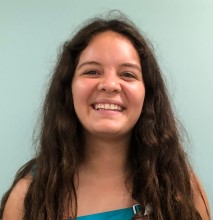The Next Wave – Cindy Yañez
You’ll already be familiar with Cindy Yañez if you’ve read the Latest Research article in this issue of the AirUCI Newsletter. She was a key participant in a new study focused on carbon dioxide emissions levels in California during the COVID-19 pandemic that was conducted by the research team of AirUCI’s Claudia Czimczik. Cindy, a Ph.D. student in Claudia’s group, took the lead on this study and is first author of the AGU Advances paper that details the findings.
During pandemic months, Cindy and her team drove a mobile laboratory belonging to the lab of Professor Francesca Hopkins of UC Riverside (who is, by the way, a UCI alumna) around Los Angeles-area freeways to measure how CO2 concentrations were changing. The van was equipped with a cavity ringdown spectrometer, a global satellite positioning device, a compact weather sensor, and other equipment to collect multiple types of data.
The team also collected plant samples of invasive annual grasses with help from a volunteer team of community scientists across the state. The typical growing season of these grass species lasts from March to May, which coincided with California's statewide Stay-At-Home Order (March 19 to May 4, 2020). The Czimczik team then analyzed the radiocarbon content of these grasses. “Plants absorb CO2 during photosynthesis and incorporate it into their tissues, recording a snapshot of local fossil fuel inputs in the process,” said Cindy.
Because radiocarbon is in every living thing but not in fossil fuels, it serves as a proxy for fossil fuel emissions. “Radiocarbon is made naturally in the atmosphere, oxidized to CO2 and taken up by plants. All living things (that fix carbon via photosynthesis or eat plants or eat plant eaters) are naturally labeled with a known amount of radiocarbon,” said Claudia.
Cindy’s hope is that that further development of these techniques could be used to monitor decarbonization at local and regional scales, and could then be a factor as agencies establish traffic and industrial policies to reduce carbon emissions. Because of her background, it’s personal to her.
Cindy grew up in the Coachella Valley, a notoriously hot and dusty desert region of California which, thanks to irrigation, is a key area of agricultural production. Since many residents there work outdoors in farming or tourism, and since the area is expected to get even hotter and drier with a warming climate, she was concerned about how climate change would affect residents who are already exposed to dangerous heat levels. Cindy was inspired to study urban emissions and how they are changing over time in order to ensure we meet our carbon reduction goals and mitigate the impacts of climate change.
She graduated Magna Cum Laude from UC Riverside, receiving a B.A in Physics with a concentration in Applied Physics and Engineering. She is an author on several publications and is the recipient of numerous awards, fellowships, and scholarships. In April 2022, Cindy received UCI’s Latino Excellence and Achievement Award in recognition of her research to better understand the consequences of climate change in California.
Cindy likes to travel, try new foods, go camping, and hang out with her family and her cats. Her career plans include an interest in contributing to the research and regulation of greenhouse gas emissions, hopefully in a position that works within the intersection of climate change research and policy. She has already made significant contributions to this area, and we look forward to much more from Cindy.

